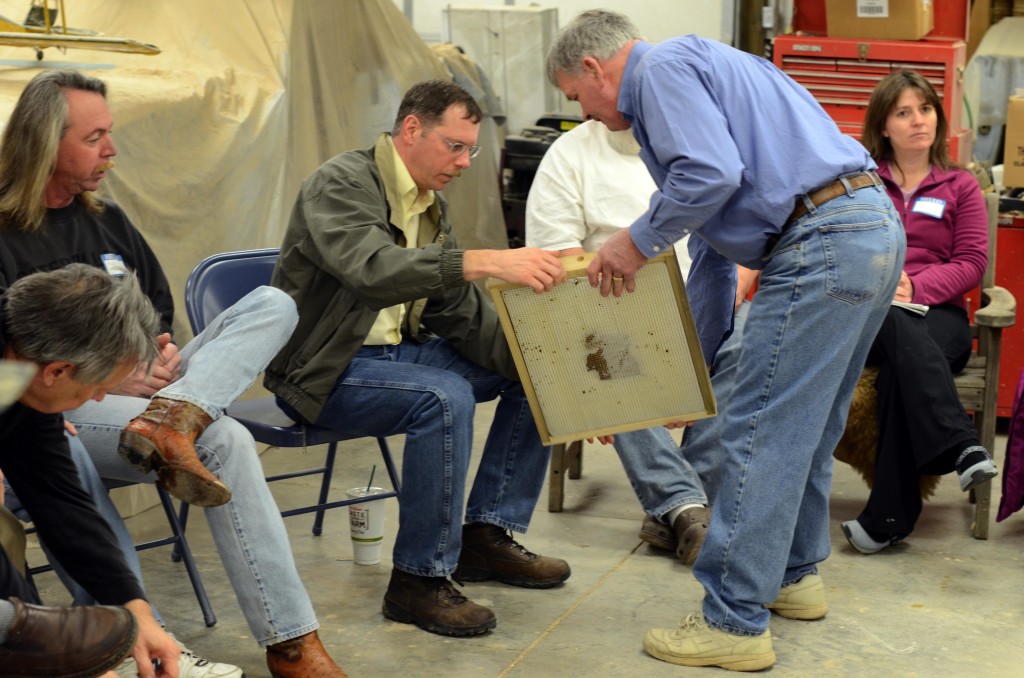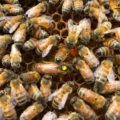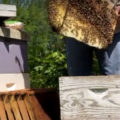As I endeavor to follow in my dads footsteps with Beekeeping, attending our local bee club has been not only a great bee resource, but the friendships forged have made it so much more. It’s been my primary resource for beekeeping knowledge. When I was a kid in the late 70’s, I helped my dad work the hives for a while. After he kept losing his hives to the mites, I recall vividly the day he threw his hands in the air and said, “I’ve had it! The mites have taken their last hive,” and he moved on to other interests. I didn’t think much about it at the time, but it’s clear to me now that he, after 8-10 years of beekeeping, was doing it all by himself and had few others to draw help from. I never saw my dad as a quitter… since he was up and on to something else, blacksmithing, winemaking and woodworking… and doing all of them very well. My dad definitely wasn’t a member of any bee club. In fact, we where in the middle of Cheviot on Cincinnati’s West side and sandwiched with neighbors. My dad’s little plot was Cheviot’s un-named greenspace, a kid’s paradise and a one-man bee club.
I know now that the challenges he faced, he was facing alone. Challenges take time to understand and then conquer. It’s sure helpful to have some like-minded friends to bounce things off of. The club is just that. It’s a group of enthusiastic beekeepers of all ages and gender, all in the pursuit of beekeeping for various reasons.
There’s my story. Now, are you wondering the point of all this? I say attend your local be club because it allows you to share your experiences and ask the questions you have. Hearing timely information at each meeting is also helpful.
No bee club in your area? It is not unreasonable to start one. A few people in my area started ours as an informal gathering the third Thursday of each month in the workshop of a fellow beekeeper. When I came to my first SIBA meeting, there were like 10 or so people. I helped them set up a website and we send monthly email meeting reminders. We have seen 85 people at our spring meetings. Thus far, there’s been no money, no dues and no formal organization. All we have is a donation can that we point out at each meeting. The money in the can goes to supporting things from snacks at meeting, to bringing in guest speakers. More recently, we even bought a “club” extractor set up for members to check out and use for their honey harvests.

You might ask, how long can it last with no dues to keep it going? Well, for our group at least, people are energized to come and talk about bees and share stories. Because of this, people contribute whatever they can. Some bring snacks to the next meeting, some step up to run meeting topics, and others volunteer to be mentors. It’s happened organically for us. Not only has it lasted, but it grows more and more each year. In fact, some of our attendees traveled over an hour to come to our meetings. As a result, some have taken the initiative to start a new bee club closer to them. We’re currently working together to keep one site that supports both gatherings. Our little SE Indiana group doesn’t just happen. It basically takes motivating those who come… and to keep the torch lit. Other clubs have asked… how do we do it? So… how does it all come together?
I asked around a little to try and find some of the original founders of our group (SIBA). They were Jerry Brelage, Jon Wismann, Harry Hammond, then later Brian Lantgen, Bob Hughes, Jim Farmer… and then Jim Orem and Garry Reeves. What started as an idea was perpetuated by the love of beekeeping, and nature… and of course fellowship among friends. Like any growing group of people, there comes the need for coordination, meeting space, funding for basic needs… the list goes on.
I’ve noticed that our success has come by the generosity of people like Garry Reeves who offers his space to host meetings and Jim Orem who fervently recruits, gets the word out about beekeeping, lines up meeting topics, and provides mentor experiences. It also comes from many members like us who are willing to run a demonstration, be a mentor or bring snacks for the next meeting, and volunteers who have helped.
While we are so happy to have a great group of volunteers, we never want their efforts to become a burden. I have taken it upon myself (after talking with a few others who agree) to simply point out our donation can. If you feel that your experience is as worthy as mine, please consider donating anything… anything at all to the can. It is true, we use the money in the can to buy refreshments for the meetings, and typically, there’s only enough in the can to cover that at best. However, there’s so much more that we could do with contributions. For example, Garry once took the money in the can and added some more of his own money to get the educational bee frames that have pictures and educational information for new beekeepers to view at the meetings.

Because of Garry’s friendship with Mel Disselkoen, he was able to get Mel to come and speak with us in November. Thankfully, everyone at that meeting donated to the can as we passed it around to cover Mel’s expenses for traveling down to see us. Everyone stepped up when they were made aware of what was being done… in the name of bolstering our beekeeping knowledge.
We try to provide other opportunities such as bee school, workshops and other events. However, it becomes difficult when there is no formal organization that is established to fund such things. Here again, it’s just fueled by the motivation of our members. Since it’s happened for our group, it can happen elsewhere. You’d be surprised how many beekeepers there likely are in your area. Good luck!





Leave a Reply